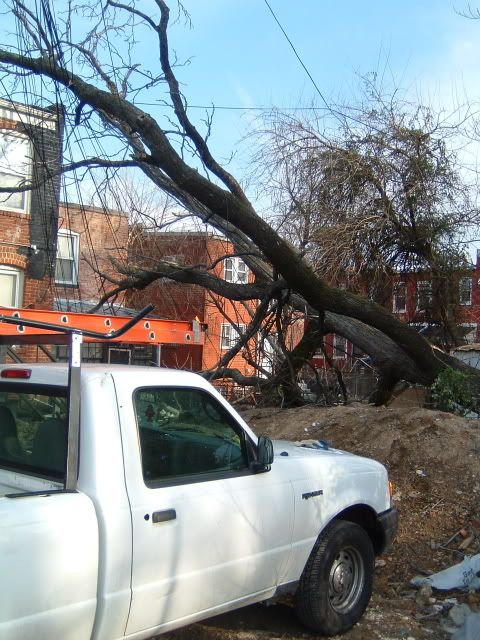Well, since I can't upload pics until I get a new computer, or fix my old one, it would be pointless to describe the work I did recently. (I can't pat myself on the back properly without picks that confirm how awesome my mighty plumbing skiilz are). But I must say that I am very happy with
Lowe's recently. They didn't have every piece in brass that I needed, but they did have most of them and the ones they didn't , they still had in both galvanized and black pipe (home depot had it in neither). Take THAT
Home Depot! I also bought a cool Corldless Drill there (24 volts, baby!). But I haven't used it yet, so I'll wait to give you the product review.
In the meantime, I think I should expand on my previous bubble talk. Both to make it more understandable and prove my Derviatives Geek street cred.
So to fully expain the causes/effects of the bubble I had to think of how to explain it with everyday terms. Here is an analogy. Let’s say you open up a shop that sells ham and cheese sandwiches. You are making a lot of money at it, of course. So other people start to open up more sandwich shops. The competition pushes down sandwich prices and you make less money. This is how things work in the real world, until the government sticks it's nose into it. The government always sees a problem, then goes in and makes it worse.
The Fed Chairman sees the slowdown in sandwich sales and decides that, to avoid the prices of sandwiches going down (deflation!) he should print more money (i.e. lower the short-term interest rates). In order to prevent that money from being spent on other things (like cars), congress passes certain tax laws and subsidies to make sure that the money goes to sandwich shops (they make the interest on sandwiches tax deductible, and if you invest in a sandwich shop and sell it after two years, you pay no tax on the sale etc.). They also set up quasi-federal agencies (Fannie Mae etc.) to give below market government guarantees to loans on sandwich shops.
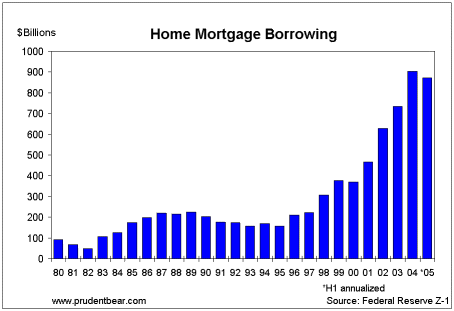
All of a sudden, lots of people start going to sandwich shops and the price of ham, cheese and bread go up. You used to be able to make a sandwich for a $1 and sell it for $3. The higher prices now mean that it costs you $2 to make a sandwich and you sell it for $4. After prices rise again, it costs you $3 to make a sandwich. You try to raise prices to $5, but no one buys your sandwiches, so you drop the price back down to $4, to keep the food from spoiling and you losing everything.
Now, here is where the problem comes in. As the price of ham, cheese and bread keep going up, soon it will cost more to make a sandwich than you can sell it for. That’s when you the sandwich bubble will end.
Now, onto real estate: If you hadn’t noticed, the price of energy has gone way up recently. (people blame the arabs and Opec, but that’s not the real reason). The price of steel is at record prices too (people blame China, but that’s not the reason either). The price of Lumber (damn Canadians!), cement (damn Katrina!) and Drywall are all up. In addition, copper(damn internet!), cocoa(damn Ivory Coast riots), steel, gold are all at record prices. So instead of asking “why are commodity prices rising” you can ask the opposite “why is the value of the dollar falling?”.
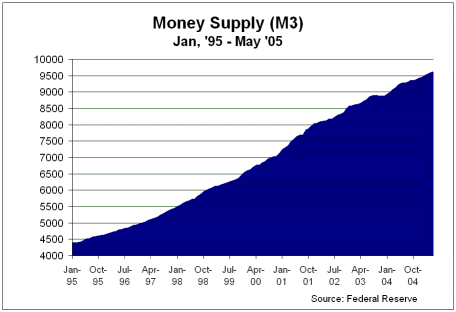
The value of the dollar is falling because we are printing so much money. They are printing so much of it, in fact, that begining in
March, they won't even tell you how much of it they are printing anymore. With all that money floating around, just like in post-WWI germany, you have inflation in the price of raw goods. Now when the price of concrete, drywall, lumber, land and construction labor keeps going up, it will reach a point where it costs more to build these houses/condos than you can sell them for. And don’t kid yourself, this isn’t NYC, there is a practical limit on how high prices can go. Two government employees can’t afford a million-dollar first home, and two associates at a top law firm would barely be able to do so.
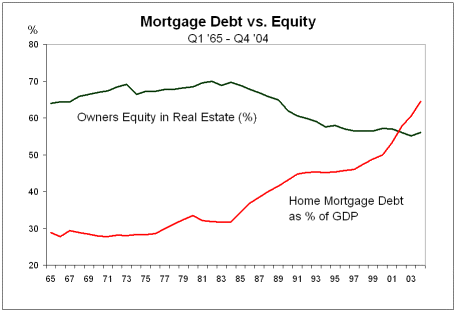
So, the reason the bubble will end, will have to do with rising commodity prices, not rising interest rates. There is only one real estate investor,
Tom Barrack, who I have ever seen who said this will be the reason, not interest rates, for the end of the real estate boom. Although he doesn’t mention
Mises or Austrian Business Cycle Theory, his description is pretty similar.
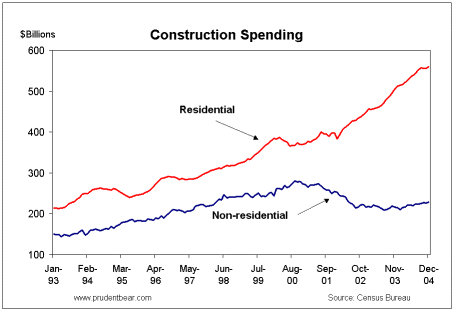 In fact, he sees signs of the tech bubble mentality in real estate. Too much capital is chasing real estate, he explains, with hedge funds, private equity groups, and rich investors all bidding on the same properties. "They've driven prices to the point where the yields on high-quality properties are like the returns on bonds, around 5 percent or 6 percent," says Barrack. "That's too low."
In fact, he sees signs of the tech bubble mentality in real estate. Too much capital is chasing real estate, he explains, with hedge funds, private equity groups, and rich investors all bidding on the same properties. "They've driven prices to the point where the yields on high-quality properties are like the returns on bonds, around 5 percent or 6 percent," says Barrack. "That's too low."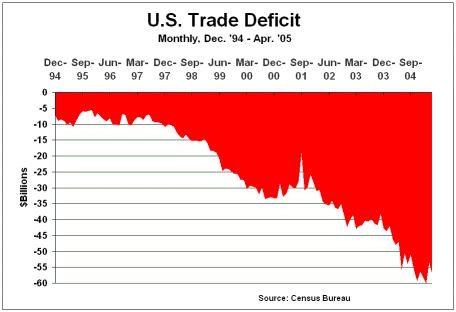
Now, what about interest rates? Well, some people think that The new Fed Chairman (or the old one) has some effect on mortgage rates and will cause the bubble to burst when he raises short-term rates. That's incorrect. Mortgages are affected by long-term interest rates that are priced at a certain amount over U.S. Bonds. Since we buy more from places like China and Japan than we sell, they have a lot of dollars. Dollars are like a gift certificate that can only be used in the US. But their holders are not buying US goods with these dollars, but they have to buy something with it. So they end up buying US Treasury Bonds. All those billions going into US Bonds has bid their price up, making the interest payable on them lower. SInce the interest on US Bonds is lower, the interest on mortgages are lower. WHen foreigners decide to stop buying US Bonds (because with the falling dollar, it makes it a losing investment) interest rates will go up. But, as I said, the bubble's end will be caused by other factors.
Now, given the history of past real estate bubbles, it's possible that prices won't collapse. THey may just stay where they are for the next 10-12 years (like what happened in DC prior to 1999). It all depends on how many flippers try to sell at the same time. What makes real estate bubbles different from stock bubbles is that non-speculative owners can hold onto their property and stabilize the market. This makes me less afraid of buying property in a place like DC where people live and work than in a place like Vegas where a lot of the price appreciation comes from flippers who have no intention of living there and who will sell at the first sign of trouble. Still, Anyone that tells you that real estate always goes up or that paying $800k for a 2BR condo (with a $700 a month condo fee) is a great investment is smoking some serious crack.
I'm not saying not to buy a house (I own one and part of another one), but make suer the numbers make sense and don't buy using a variable rate mortgage because you will get kicked in the financial nuts when the Chinese start shifting their assets from US Bonds to gold or other currencies like the Euro.
All graphs were from THe
Prudent Bear.
 You know he's got a bunch of dirt in his driveway, like this which makes it harder to use my driveway, especially when it encourages other illegal dumpers...
You know he's got a bunch of dirt in his driveway, like this which makes it harder to use my driveway, especially when it encourages other illegal dumpers...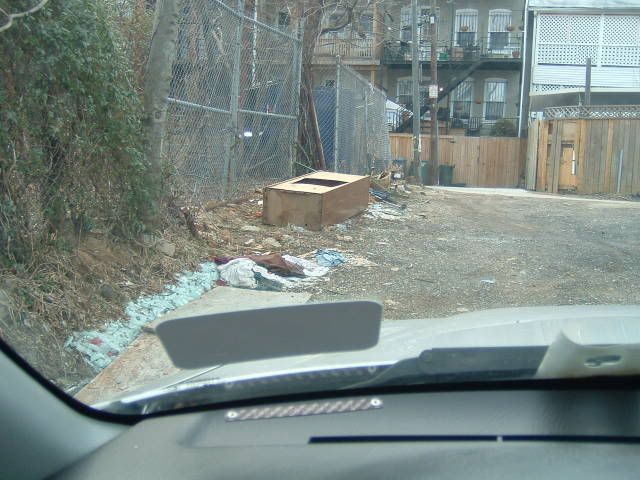 like this. (some dumped a couple of mattresses and boxpsrings after this, but I didn't take a pic because I am lazy).
like this. (some dumped a couple of mattresses and boxpsrings after this, but I didn't take a pic because I am lazy).